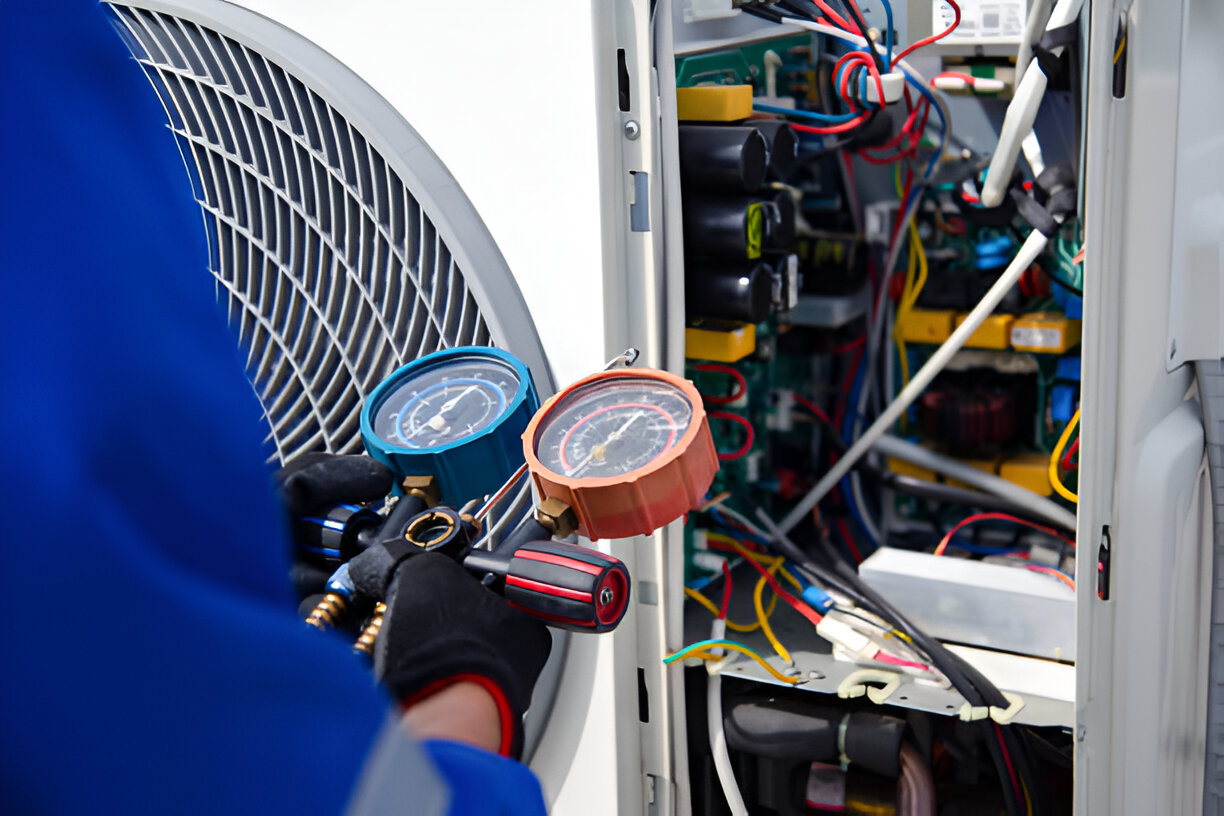
AC Installation in Airville, PA
Replacing or installing a new air conditioning system is one of the most impactful home improvements you can make for comfort and efficiency in Airville, PA. With hot, humid summers and a mix of older farmhouses and newer suburban construction in York County, the right system, properly sized and installed, delivers reliable cooling, lower energy bills, and improved indoor air quality.
Why proper installation matters in Airville, PA
Airville residents face humid summers that push HVAC systems harder than in drier regions. Older homes may have undersized or leaky ductwork, and rural properties sometimes require customized solutions where conventional duct routes are impractical. A correctly selected and installed system prevents short cycling, uneven temperatures, higher energy use, premature equipment failure, and moisture problems that can affect comfort and building materials.
Common AC installation types and when each makes sense
- Split systems (central AC with indoor air handler and outdoor condenser)
Best for homes with existing ductwork. Offers efficient whole-house cooling and pairs easily with high-efficiency air handlers or variable-speed technology for balanced comfort. - Packaged systems
Good for homes without interior space for an air handler. All components sit outside or on the roof. Useful for compact properties or remodels where interior space is limited. - Ductless mini-split systems
Ideal for older Airville homes with no ductwork, additions, sunrooms, or finished basements. Provides room-by-room control, high efficiency, and simplified installation where ductwork would be costly.
Pre-install assessment: what gets inspected and why
A thorough pre-install assessment prevents common problems and ensures the new system will perform as expected. Typical steps include:
- Load calculation (Manual J) to determine the precise cooling capacity needed based on home size, insulation, window orientation, occupancy, and Airville climate patterns. Oversizing is a common error that reduces comfort and efficiency.
- Ductwork inspection to check for leaks, insulation levels, adequate return air, and correct sizing. Leaky or undersized ducts are a frequent issue in older Lancaster and York County homes.
- Electrical evaluation to confirm service capacity, breaker sizing, and safe wiring routes for the new condenser and air handler.
- Refrigerant line and clearance planning to ensure correct line lengths, proper sloping, and outdoor unit placement with adequate airflow and noise consideration.
- Indoor air quality needs assessment to recommend filtration, dehumidification, or ventilation upgrades as appropriate for humid summers.
The installation process: step-by-step overview
- Site preparation — Protect floors and landscaping, set outdoor pad or mounting, and prepare routing for refrigerant lines and condensate.
- Ductwork modifications or installation — Repair leaks, add returns, or install new ducts when required for efficient airflow. For ductless systems, plan interior wall locations for air handlers.
- Equipment placement and mounting — Install the condenser, air handler or packaged unit, and secure all connections. Position outdoor equipment away from windows and neighbors when possible.
- Refrigerant and electrical connections — Evacuate and charge refrigerant per manufacturer specs, and complete all electrical hookups following local code.
- Insulation and sealing — Insulate refrigerant lines and seal penetrations to prevent energy loss and moisture intrusion.
- System startup — Initial power-up and basic operational checks.
Commissioning and performance testing
Commissioning confirms the system meets design expectations. Typical testing includes:
- Verifying refrigerant charge and superheat/subcooling per manufacturer specifications.
- Measuring airflow (CFM) across supply registers to confirm balanced distribution.
- Recording temperature split across evaporator coil (supply vs return) to assess cooling effectiveness.
- Checking electrical draw and component performance to ensure safe, efficient operation.
- Running humidity and comfort checks through a full operating cycle to confirm dehumidification and steady temperatures.
All findings should be documented so you have a permanent record of system baseline performance.
Homeowner walkthrough and maintenance recommendations
After installation and testing, you should receive a clear walkthrough covering:
- How to operate the thermostat and recommended setpoints for comfort and efficiency in Airville’s climate.
- Filter type, location, and replacement frequency. High-humidity summers often require more frequent filter changes.
- Basic troubleshooting steps and what symptoms warrant professional service.
- Seasonal maintenance tips, including spring start-up checks and fall shutdown advice for dual-fuel or heat pump systems.
Regular maintenance extends equipment life and preserves manufacturer warranties. Typical recommendations:
- Replace or clean filters every 1–3 months depending on use and indoor air quality.
- Schedule professional tune-ups twice a year for split systems (cooling and heating season checks).
- Keep outdoor condenser free of debris and vegetation for unobstructed airflow.
Compliance, permits, and local code handling
AC installations in Airville, PA typically require adherence to York County code and state electrical and mechanical standards. Professional installers coordinate permit applications, inspections, and final approvals with local authorities. Proper documentation helps with resale, insurance, and ensures systems meet safety and efficiency requirements.
Manufacturer warranties and documentation
Most new systems include a combination of:
- Parts warranty from the manufacturer, covering components for a specified period.
- Compressor warranty which may be separate and longer-term on quality units.
- Labor warranty or workmanship guarantee from the installer, which protects against installation-related issues.
Make sure to receive all warranty paperwork, proof of installation, charging records, and any required registration instructions to preserve coverage.
Long-term benefits of a professional AC installation in Airville, PA
A correctly sized and installed AC system improves comfort, controls humidity, lowers energy bills, reduces repair frequency, and protects your home’s building envelope. For Airville residents, addressing local humidity and older ductwork issues during installation delivers the most reliable, long-lasting results. Investing in professional assessments, quality equipment, and routine maintenance ensures the system performs efficiently through hot summers and contributes to healthier indoor air year-round.


Enjoy flexible financing options that make upgrading or repairing your HVAC system easy and budget-friendly.










